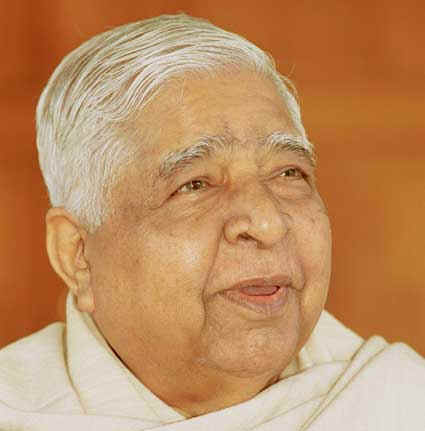
“In every generation, there are a few visionary and profound masters who hold high the lamp of the Dharma to illuminate the world. Like the Dalai Lama and Thich Nhat Hanh, Ven. S.N. Goenka was one of the great world masters of our time.” ~ Jack Kornfield
.
Before taking my Vipassana course, I had no idea who S.N Goenka was.
Like the majority, I’m familiar with Vipassana—but I’m not familiar with who’s behind it. After taking the course, and learning that S.N. Goenka is the man who introduced Vipassana to the world (and taught it), I’ve realized that he is one of the most underrated spiritual teachers we know.
Goenka was a retired industrialist who suffered from severe migraine headaches. His search for a cure brought him into contact with Sayagyi U Ba Khin, who taught Vipassana. Under the guidance of U Ba Khin, Goenka practiced Vipassana for many years and was later authorized as a teacher of Vipassana meditation by U Ba Khin.
Vipassana is one of India’s ancient meditation techniques that allows us to experience the reality of things. It teaches us about ourselves and guides us to become more aware and balanced. I was lucky enough to take a 10-day intensive Vipassana retreat in India this year. The course was taught by S.N. Goenka, using his recordings and discourses. One thing I couldn’t help wondering about was our unfamiliarity with S.N. Goenka.
Goenka was known for his extraordinary calmness of mind and wisdom. Although he wasn’t physically present in the retreat, he influenced me to a great extent. Because of the difficulty of the timetable and the guidelines of the Vipassana course, I almost quit several times.
However, I’m deeply grateful I didn’t quit, because S.N. Goenka has truly changed my perceptions on many things. I left the course a different person. Goenka’s words transformed my inner being in ways I couldn’t have possibly imagined.
I’m convinced that the wisdom behind his words can deeply inspire us even if we’re not planning to take the Vipassana course. In short, Goenka is a good example of how one must face situations in everyday life. He is an example of equanimity, perseverance and peace of mind.
Below are 10 of his sayings that have personally influenced me during the course:
“Remaining in ignorance is harmful for everyone; developing wisdom is good for everyone. A Christian will become a good Christian, a Jew will become a good Jew, a Muslim will become a good Muslim, a Hindu will become a good Hindu, a Buddhist will become a good Buddhist. One must become a good human being; otherwise one can never be a good Christian, a good Jew, a good Muslim, a good Hindu, a good Buddhist. How to become a good human being—that is most important.”
“Nobody causes suffering for you. You cause the suffering for yourself by generating tensions in the mind. If you know how not to do that, it becomes easy to remain peaceful and happy in every situation.”
“The first step toward emerging from suffering is to accept the reality of it, not as a philosophical concept or an article of faith, but as a fact of existence which affects each one of us in our lives.”
“To be truly religious we must develop the religious attitude: purity of heart, love and compassion for all. But our attachment to the external forms of religion leads us to give more importance to the letter of it than the spirit. We miss the essence of religion and therefore remain miserable.”
“Whatever necessities you require, work to get them. If you fail to get something, then smile and try again in a different way. If you succeed, then enjoy what you get, but without attachment.”
“If you make a mistake you accept it, and try not to repeat it the next time. Again you may fail; again you smile and try a different way. If you can smile in the face of failure, you are not attached. But if your failure depresses you and success makes you elated, you are certainly attached.”
“When a problem arises in daily life, take a few moments to observe your sensations with a balanced mind. When the mind is calm and balanced, whatever decision you make will be a good one. When the mind is unbalanced, any decision you make will be a reaction. You must learn to change the pattern of life from negative reaction to positive action.”
“You must not allow people to do wrong to you. Whenever someone does something wrong, he harms others and at the same time he harms himself. If you allow him to do wrong, you are encouraging him to do wrong. You must use all your strength to stop him, but with only good will, compassion, and sympathy for that person. But you cannot have good will for such a person unless your mind is calm and peaceful.”
“Learn to observe objectively whatever is happening. If someone is angry and tries to hide his anger, to swallow it, then it’s suppression. But by observing the anger, you will find that automatically it passes away. You become free from the anger if you learn how to observe it objectively.”
“We are influenced by the people around us and by our environment, and we keep influencing them as well. If the majority of people, for example, are in favor of violence, then war and destruction occur, causing many to suffer. But if people start to purify their minds, then violence cannot happen. The root of the problem lies in the mind of each individual human being, because society is composed of human beings. If each person starts changing, then society will change, and war and destruction will become rare events.”
~
Author: Elyane Youssef
Image: WikiMedia Commons
Editor: Yoli Ramazzina


 Share on bsky
Share on bsky




Read 3 comments and reply